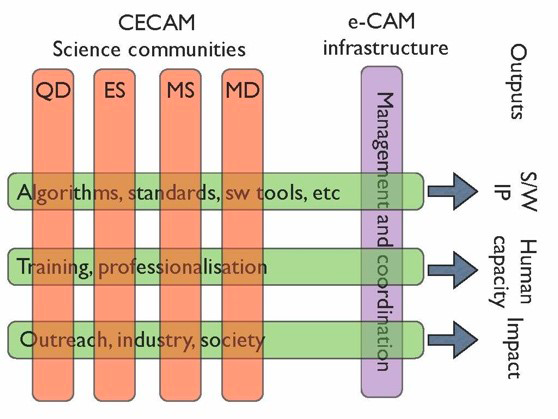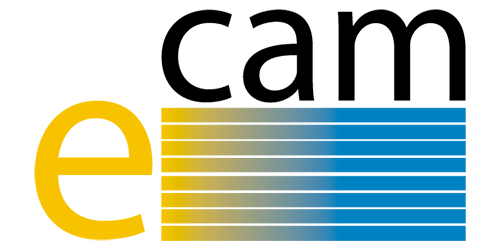The E-CAM Centre of Excellence is an e-infrastructure for software development, training and industrial discussion in simulation and modelling. E-CAM is based around the Centre Européen de Calcul Atomique et Moléculaire (CECAM) distributed network of simulation science nodes, and the physical computational e-infrastructure of PRACE. We are a partnership of 13 CECAM Nodes, 4 PRACE centres, 12 industrial partners and one Centre for Industrial Computing (Hartree Centre).
E-CAM aims at
• Developing software to solve important simulation and modelling problems in industry and academia, with applications from drug development, to the design of new materials
• Tuning those codes to run on HPC, through application co-design and the provision of HPC oriented libraries and services;
• Training scientists from industry and academia;
• Supporting industrial end-users in their use of simulation and modelling, via workshops and direct discussions with experts in the CECAM community.
Our approach is focused on four scientific areas, critical for HPC simulations relevant to key societal and industrial challenges. These areas are classical molecular dynamics, electronic structure, quantum dynamics and meso- and multi-scale modelling. E-CAM develops new scientific ideas and transfers them to algorithm development, optimisation, and parallelization in these four respective areas, and delivers the related training. Postdoctoral researchers are employed under each scientific area, working closely with the scientific programmers to create, oversee and implement the different software codes, in collaboration with our industrial partners.
So far E-CAM has
- Certified more than 250 software modules that are open access and easily available for the industrial and academic communities through our software repository;
- Trained about 500 people at our Extended Software Development Workshops in advanced computational methods, good practices for code development, documentation and maintenance;
- Deployed an online training infrastructure to support the development of software for extreme-scale hardware, contributed to the LearnHPC platform for scalable HPC training;
- Worked on 10 pilot projects in direct collaboration with our industrial partners;
- Organized 10 State of the Art workshops and 6 Scoping workshops, that brought together industrialists, software developers and academic researchers, to discuss the challenges they face;
- Worked on software development projects that enable an HPC practice with potential for transfer into industry. Examples include: GPU re-write of the DL_MESO code for mesoscale simulations; the development of a load-balancing library specifically targeting MD applications, and of an HTC library capable of handling thousands of tasks each requiring peta-scale computing; among other efforts;
- Developed original dissemination material for the general public, including a Comics issue presented at Festivals and Schools;
- Ensured sustainability of its main outputs via community effort, memberships, and the CECAM network.





